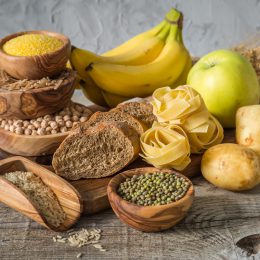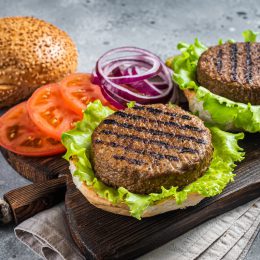5 Common Dieting Phrases to Stop Using
That voice in your head that makes you feel guilty for eating certain foods? It’s time to silence it.

Over the course of a lifetime, we pick up a lot of common sayings about food and our bodies. Many of them can seem harmless—or even helpful. But language is more complex and powerful than people may think. And when these sayings are repeated over and over again, they can impact your own relationship with food, as well as affect how those around you relate to eating (hello, grandkids).
There’s no need to feel guilty if dieting language has slipped into your vocabulary. It’s everywhere. But it’s never too late to learn why certain popular sayings may do more harm than good. Here, top dietitians share five common but toxic dieting phrases to avoid, plus how to adjust your thinking to promote a healthier body image.
Toxic Dieting Phrase #1: “You Lost Weight, You Look Great!”
We’ve all been there: You haven’t seen someone in a long time and they’ve clearly lost weight, so your well-meaning instinct is to compliment their body. However, experts say that’s not a good idea.
“You never know how someone is achieving weight loss,” says Brittany Crump, a registered dietitian and the owner of Savor Nutrition. “Someone could have lost weight due to sickness, depression, or an eating disorder. Complimenting someone on weight loss, especially someone who is struggling with disordered eating, reinforces unhealthy behaviors.”
What’s more, very few people are able to sustain a significant amount of weight loss over the long term. A meta-analysis of 29 long-term weight-loss studies found that within two years of losing weight, more than half of it was regained. After five years, more than 80 percent of weight lost was regained.
Why is that relevant? Telling someone that their body looks great after they’ve lost weight implies that it didn’t look great before. The person might feel good receiving the compliment in the moment, but if they’re among the vast majority of people who regain lost weight within a year or two, remembering the positive reaction to their smaller body will likely make them feel worse.
If you’ve noticed that someone’s body has changed, the best thing to do is keep quiet—their weight isn’t your concern.
Toxic Dieting Phrase #2: “I’m So Bad for Eating [Insert Food Here]”
We’re inundated with messages that certain foods are “good” while others are “bad,” but experts say that’s not a helpful—or healthy—way of thinking.
“When we label foods as ‘bad’ and ‘good,’ we subsequently attach an emotional charge to that food decision,” says Elizabeth Gunner, a registered dietitian, speaker, and writer in New York City.
If we believe that a certain food is bad, we tend to think of ourselves as bad for eating it, which can cause unnecessary guilt and shame. Plus, when we tell ourselves that we shouldn’t eat something, we typically start thinking about it and wanting it even more, Gunner says. “What ultimately forms from these thought patterns are unhealthy and disordered relationships with food.”
To avoid this, give yourself permission to eat any food—unless you have an allergy or a medical condition that makes certain ones dangerous. If you feel guilt after eating something, it’s all right to recognize that feeling, but then shift your mindset to something positive or occupy your mind by doing something else: Call a friend, read a book, or go on a walk. Over time, this will help train your brain to move on after eating and focus on things that are more worthy of your energy.
Toxic Dieting Phrase #3: “I’m Saving My Calories for Later”
If you’ve ever restricted calories all day in anticipation of a big meal or spent the week before a major holiday “watching what you eat” to make up for the upcoming feast, it might be time to rethink the habit. This kind of behavior isn’t healthy, Gunner says.
“The main problem that I see with this harmful phrase is that we end up teaching ourselves not to trust our bodies and hunger signals,” she says. Your body has a good sense of how much food it needs: When you feel hungry, it’s a sign that you need to eat. But when you’re constantly ignoring a rumbling stomach as a way to “save calories” for later, you lose touch with those hunger cues.
“On top of this, when you ‘save calories for later,’ you often show up to mealtime ravenous and will have a tendency to overeat,” Gunner says. Some inconsistency in your day-to-day eating is fine—you might eat less because you’re super busy, or more than usual because you’re stressed, or feel less hungry than normal for no reason at all. But generally, it’s best to aim for regular, filling meals throughout the day to keep your energy levels and appetite consistent, Gunner says.
Toxic Dieting Phrase #4: “I Feel So Fat”
“Fat is not a feeling,” says Diana Mesa, a registered dietitian and the owner of En La Mesa Nutrition in Miami. That’s why she encourages her clients to challenge this thinking when it comes up.
“Typically, when someone says they are feeling fat, they’re saying so because they’ve overeaten, have become less active, or feel insecure about their body image and need validation—all of which are valid feelings and needs,” Mesa says.
Subscribe to our newsletter
It's quick and easy. You could be one of the 13 million people who are eligible.
Already a member? Click to discover our 15,000+ participating locations.
Follow Us
Instead of saying or thinking “I feel so fat,” try getting more specific: What is it you’re actually feeling? Why do you feel badly about it?
Of course, there’s more to this statement than just the semantics of fat not being a feeling. It also implies that fatness is inherently something to feel bad about, which shouldn’t be the case. If you say something like this around people whose bodies are larger than yours, they may be personally insulted, even though you’re directing the comment at yourself. We all have different bodies, and it’s possible for people to be healthy at many different weights.
Toxic Dieting Phrase #5: “It’s My Cheat Day”
Maybe you have a cheat day when you eat foods that are off limits at other times. Or maybe you don’t explicitly use that language, but you tend to restrict your eating during certain periods (say, weekdays) and then let loose at other times (like the weekend). This might seem like a way to stay in control of your eating habits, but it actually wreaks havoc on them.
“Cheat days are usually associated with binging on foods we’ve been restricting the rest of the week,” Mesa says. “This is problematic for a few reasons: First, it usually leads to overeating, making us feel physically uncomfortable. And second, ‘cheating’ on a diet tangles us up in feelings of guilt and shame for breaking the rules.”
There’s no reason to feel guilty or ashamed about enjoying food that you love. It’s not cheating; it’s enjoyable and normal. “Calling it a cheat takes away from the joy of the experience and adds a bunch of negative feelings that actually work against our health goals,” Mesa says. It’s completely possible to include the foods we love as part of a nutritious diet—no guilt necessary.
Ditching these phrases and adopting more positive language can take time, and it may be more difficult for anyone who has a particularly unhealthy relationship with food. (Not sure? Take this quiz to assess your eating habits). If you think that’s you, have an honest conversation with your health care provider. They can help you determine the best course of action and recommend a dietitian or counselor who specializes in eating issues for additional support, if needed.
Take Your Favorite SilverSneakers Classes Online!
SilverSneakers members can access live fitness classes and wellness workshops through SilverSneakers LIVE. See the latest schedule and RSVP for classes here.
Not a member? If you have a Medicare Plan, it may include SilverSneakers—at no additional cost. Check your eligibility instantly here.





